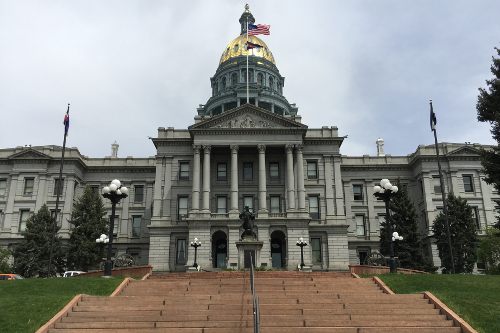By Jeffrey A. Roberts
CFOIC Executive Director
Unlike a year ago, when state lawmakers improved access to public records, the 2018 session of the Colorado General Assembly was marked by the passage of legislation that will significantly hinder the public’s right to know if it’s signed into law.
Senate Bill 18-223 would close autopsy reports on minors, making it harder for journalists to report on suspicious deaths of children, including those who die from abuse while in the care of the government system that is supposed to protect them.
But that wasn’t the only legislative disappointment for open government advocates.
Legislators rejected a measure that would have opened police internal affairs records after an investigation is complete. Although the House passed a weakened version of the bill that essentially encouraged, rather than required, disclosure of the records, Senate leaders balked at the measure, prompting the Senate sponsor to have it killed it last week.

Earlier in the session, lawmakers passed Senate Bill 18-156, which would phase out the required publication of county financial information in newspaper public notices. Newspapers have encouraged Gov. John Hickenlooper to veto the bill. “Colorado citizens have relied on legal notice advertising in newspapers throughout the state to be informed of important governmental actions since statehood,” wrote Jerry Raehal, CEO of the Colorado Press Association, in a letter to the governor.
The biggest win for transparency under the Gold Dome didn’t involve legislation: It was the exposure of a workplace culture at the Statehouse that allowed for widespread sexual harassment and misconduct that rarely had been reported, let alone dealt with.
The credit for shining a bright light on this long-standing problem goes to reporters such as Bente Birkeland of KUNC radio and John Frank of The Denver Post and the brave legislators, legislative aides, lobbyists and others who shared their stories.
Here’s how freedom-of-information and government transparency measures fared in the 2018 legislative session:
Child autopsies
As introduced and passed by the Senate, SB 18-223 made autopsy reports on minors confidential and available only to certain parties. The House added a provision that permits “any person” to petition a district court for access to a report “on the grounds that disclosure … constitutes a significant public benefit.”
That’s opposite of how public access to autopsy reports has worked for many years in Colorado. Autopsy reports are specifically excluded from a Colorado Open Records Act (CORA) provision that makes medical records confidential, and the Colorado Court of Appeals ruled in 1987 that a records custodian can deny inspection of an autopsy report on a homicide victim only by showing a court that disclosure would cause “substantial injury to the public interest.”
If SB 18-223 becomes law, journalists and others will have to wage costly court battles to obtain access to the reports. It would make thorough and reform-producing projects like “Failed to Death,” a joint 2012 investigation of the child welfare system by The Post and 9NEWS, much more difficult to pursue.
Police internal affairs records
A study conducted by a University of Denver law professor and her students established the need for House Bill 18-1404. It found that most police and sheriff’s departments around the state routinely reject public records requests for internal affairs files, leaving Coloradans “largely in the dark with regard to allegations and investigations of police misconduct.”
The bill, as introduced, would have required public disclosure of internal investigative files on an officer’s in-uniform or on-duty conduct once an investigation is complete, while allowing records custodians to redact certain information. Police chiefs and sheriffs opposed the measure, which was amended in the House to require only that records custodians follow a set of guiding principles and do what the Colorado Supreme Court mandated in 2005 – conduct a balancing test before determining that the release of internal affairs records would be “contrary to the public interest” under the Colorado Criminal Justice Records Act.
Still, when the bill was set for a hearing in a Senate committee, the Senate sponsor said he didn’t see “common ground” between proponents and opponents, and he acknowledged that Senate Republican leaders weren’t on board with the measure.
County public notices
If signed into law, SB 18-156 would change a century-old law that requires each county to publish a monthly expense report and a twice-a-year employee salary report in a local newspaper. Beginning in 2022, counties would instead be permitted to “conspicuously” publish the financial reports on their official websites if they also publish links to them in at least one newspaper.
Judicial branch records
After trying for three years, Rep. Polly Lawrence finally made a little bit of progress in her quest to make the state judicial branch subject to CORA.
The legislature approved an extremely limited version of the Roxborough Park Republican’s perennial bill, and it awaits action by the governor. As introduced, House Bill 18-1152 would have changed the definition of public records in the open records law to include the judicial department’s administrative and budget records. As amended and passed, however, the bill now only addresses access to judicial branch records of sexual harassment complaints and investigations, which are mainly available only to the “person in interest,” not the public.
Inmate whereabouts
Hickenlooper signed Senate Bill 18-014, which requires the Colorado Department of Corrections to let crime victims and prosecutors know the locations of inmates who are incarcerated out of state. The measure was introduced partly in response to DOC’s unwillingness to reveal the prison where James Holmes, the Aurora movie theater killer, had been kept behind bars.
Police radio encryption
A House committee killed House Bill 18-1061, which was designed to stop law enforcement agencies and other governments in Colorado from encrypting all of their dispatch radio communications. Journalist associations supported the measure, which Rep. Kevin Van Winkle, R-Highlands Ranch, said he introduced because of a “troubling trend” among police departments and sheriff’s offices to block the public from monitoring their radio traffic using scanners, receivers and smartphone apps.
Parent notification
House Bill 18-1269, if signed by the governor, will require schools in Colorado to notify families when teachers and other employees are arrested for certain serious crimes. The bill was prompted by a series of Denver7 stories showing that parents sometimes aren’t told when a school employee is arrested and charged with a sexual crime involving a minor victim.
Denver Health records
The governor signed Senate Bill 18-149, which limits public access to the records of the Denver Health and Hospital Authority. The legislation, the sponsor said, is intended to protect the privacy of patients, mostly from “data miners” who request electronic records on behalf of commercial interests. The new law still requires public disclosure of “the account of all money received by and disbursed on behalf of the authority.”
PUC transparency
A Senate committee killed House Bill 18-1281, which included provisions requiring the Colorado Public Utilities Commission (PUC) to keep written and audio records of commission proceedings and post them online.
Oil and gas incident reporting
A Senate committee killed House Bill 18-1157, which would have required oil and gas operators to file written reports of incidents such as fires, spills and accidents with injuries. Much of the information was to be made public in an online, searchable database.
Presidential tax returns
House Democrats tried again, unsuccessfully, to require candidates for president and vice president of the United States to disclose their federal income tax returns for the previous five years. House Bill 18-1318 would have kept candidates’ names off the ballot if they failed to comply.
Online campaign ads
House Bill 18-1403 failed in a Senate committee. The bill would have required disclaimer statements, identifying the names of independent committees funding online communications that advocate for or against a political candidate.
Follow the Colorado Freedom of Information Coalition on Twitter @CoFOIC. Like CFOIC’s Facebook page. Do you appreciate the information and resources provided by CFOIC? Please consider making a tax-deductible donation.




